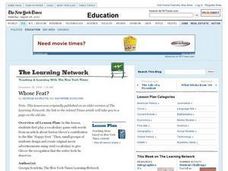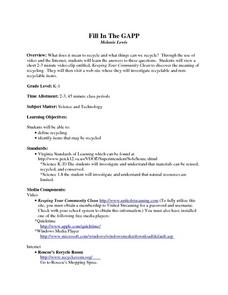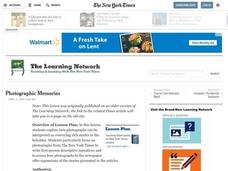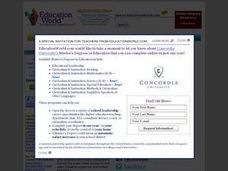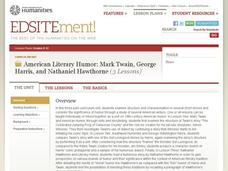Objective Teacher Resources
Find Objective lesson plans and worksheets
Showing 1,976 resources
Curated OER
Whose Feat?
Play a vocabulary game with words from an article about Savion Glover's contribution to the film "Happy Feet." Then, small groups of young scholars design and create original movie advertisements using vivid vocabulary to give Glover the...
Curated OER
Lesson: Storyboarding Revolution
Kids consider revolution as a basis for creativity, art, and storytelling. After reading an excerpt from the book, Persepolis, learners choose one event from any world revolution to write about. They storyboard the event focusing on...
Curated OER
Frederick Douglass, Narrative of the Life of Frederick Douglass an American Slave, Written by Himself
Foster reader confidence when encountering complex text and reinforce the skills readers have acquired to build and extend their understanding of text. The plan uses a section of Douglass’ narrative as an exemplar text. Directions for...
Curated OER
5 Broken Cameras: How Storytellers Shape the Story
5 Broken Cameras, the award-winning documentary nominated for a 2013 Academy Award and winner of the Sundance 2012 Directors Award is the focus of a resource packet that includes a lesson plan, discussion guide, reading lists, background...
Personal Genetics Education Project
DNA, Crime and Law Enforcement
Civil rights meets biotechnology in a instructional activity that scrutinizes the collection of DNA of citizens who have been arrested, but not yet convicted of a crime. Real-life cases are examined in which the DNA of a relative was...
Facing History and Ourselves
The Power of Images
One picture but a thousand stories. As a part of a case study of how the death of Michael Brown was reported by professional news sources and on social media class members examine the reactions of various groups to a photograph taken by...
Curated OER
Kitchen Appliances and Utensils: Home Living / Daily Living
There are so many different types of tools we use in the kitchen, everyday. Help your special needs learner discover how to recognize, identify, and use various kitchen utensils and appliances. Using picture cards and drill prompting,...
Curated OER
Casting a Wary Eye?
Help learners examine racial profiling of Arab-Americans and Middle Eastern Americans in the wake of the September 11, 2001 terrorist attacks. They will be asked to look at beliefs, actions, and behavior towards this group of people...
Curated OER
Debating Controversial Issues: Integrating Science and Current Events
In order to give young scientists experience with critical thinking skills, introduce them to a current controversy and prepare them to debate. Choose a topic, such as genetically modified organisms, and assign groups to represent...
Curated OER
Fill In The GAPP
Youngsters discover what recycling is and identify things that can be recycled. They use both video and Internet resources to aid them in their study. This is a well-designed lesson with excellent activities and a nicely-written letter...
PBS
Stories of Painkiller Addiction: The Cycle of Addiction
Drug addiction, including prescription drug addiction, begins with a reason that's different for every user. High schoolers learn more about the reasons people begin abusing drugs with a set of videos and worksheets that discuss four...
Curated OER
Understanding Tiananmen Square
William Bell's Forbidden City is used as the basis of a study of China, Chinese culture and government, and especially of the events in Tiananmen Square in 1989. Class members select a topic for Internet research and then prepare a...
Curated OER
Monsters
Do monsters really exist? Find out what your class thinks with these discussion questions prior to reading Beowulf. Incorporate music and a video clip into the anticipatory set to engage your learners. Take a day to search online...
Common Sense Media
Which Me Should I Be?
Impress upon learners the importance of considering how we identify ourselves online, and how this relates to overall considerations of safety and digital wellness.
Common Sense Media
Cyberbullying: Crossing the Line
Teach pupils to identify different forms of cyberbullying, including harassment, deception, “flaming,” and threats to safety, as well as how to handle a situation in which cyberbullying might be involved.
Curated OER
Press Review
How can word choice affect a political speech? Middle and high schoolers examine the text of the 1999 State of the Union Address, and then determine how newspaper articles and television reports describe and analyze the event. Use this...
Curated OER
Photographic Memories
Explore how photographs can represent a whole story to a viewer. Middle schoolers work on narrative writing techniques in this lesson plan, focusing on photographs from the New York Times to write first-person descriptive...
Library of Congress
To Kill A Mockingbird: A Historical Perspective
Students study the novel, To Kill a Mockingbird. Through studying primary source materials from American Memory and other online resources, students of all backgrounds study the relationships between blacks and whites.
Curated OER
Digging Up Dino Data
Third graders use the Internet to research a specific dinosaur. They work in pairs and individually to browse dinosaur websites, take notes on pertinent information, write, edit and illustrate reports. They post their work.
Curated OER
Dragonwings: Evaluate Chapters 10-12
As your class finishes the novel Dragonwings, use these culminating projects. A vocabulary list is given for chapters eleven and twelve and either an epitaph or letter activity concludes the book. The final project consists of creating a...
Curated OER
Working on the Slant
Compare and contrast a major news story from various newspapers. How does the perspective change? Are certain things included in some of the stories and left out of others? Have pupils complete a graphic organizer to compare how...
Curated OER
Edward R. Murrow: This Reporter
What would Edward R. Murrow think of today’s news broadcasts? Learners examine the work of the first public television newscaster and his commitment to researched, accurate reporting. The eight-day study concludes with investigators...
National Endowment for the Humanities
American Literary Humor: Mark Twain, George Harris, and Nathaniel Hawthorne
Nathaniel Hawthorne as a humorist? Really? The three lessons in this series focus on the the storytelling style, conventions, and literary techniques employed by Hawthorne, George Washington Harris, and Mark Twain.
National Endowment for the Humanities
The House Un-American Activities Committee
Was the House Un-American Activities Committee justified in investigating subversive influences in the entertainment industry? Part two of the three-part series of lessons that examine the anti-communism movement after World War II,...


